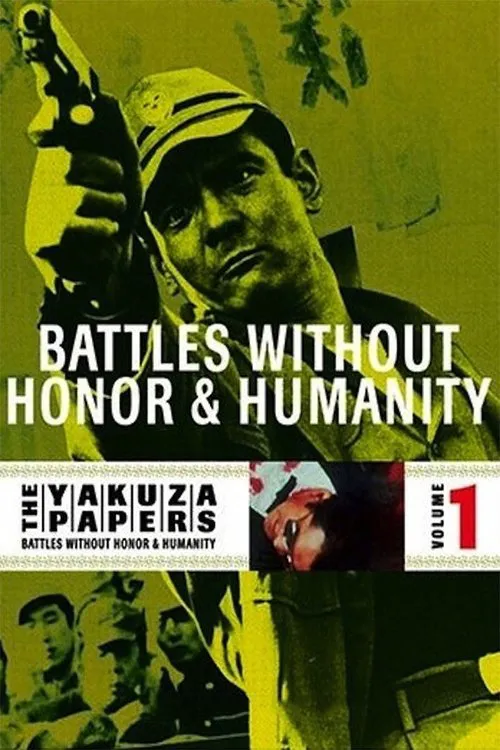Battles Without Honor and Humanity

Plot
Battles Without Honor and Humanity is a 1973 Japanese action drama film, directed by Kinji Fukasaku. The movie is the first installment in the Battles Without Honor and Humanity series, which explores the violent and tumultuous world of Japanese organized crime, specifically the yakuza, in the post-World War II era. The film takes place in the early 1960s, in the city of Hiroshima, where a young and ambitious yakuza member, Shozo Hirono (played by Bunta Sugawara), rises through the ranks and becomes embroiled in an intense struggle for power within the organization. The movie opens with a somber and gritty depiction of the harsh realities of postwar Japan. We see the devastating aftermath of the Hiroshima bombing, where entire neighborhoods lie in ruins and survivors struggle to rebuild their lives. Amidst this backdrop, we are introduced to Shozo Hirono, a young and ambitious yakuza member who has been demoted and is struggling to make a name for himself within the organization. Hirono is determined to escape his current status and become a respected member of society, but his ambitions put him at odds with the strict code of honor and loyalty that governs the yakuza. As Hirono tries to navigate the complex web of politics and loyalty within the organization, he is drawn into an intense struggle for power between various factions vying for control. We see the ruthless and cunning leader, Ichi (played by Nobuo Kaneko), who is determined to eliminate his rivals and establish himself as the dominant force within the organization. Ichi is a cold-blooded and calculating individual who has no qualms about ordering the murder of his enemies or betraying those who stand in his way. Hirono's fate becomes increasingly intertwined with that of a fellow yakuza member, Kinjiro Kozaburo (played by Tetsuro Sagawa), who shares his ambitious goals. However, their paths are fraught with danger, as they are constantly threatened by those who seek to eliminate them. In particular, they must contend with the enigmatic and deadly figure of Jiji Oba (played by Tetsu Nakamura), a veteran yakuza member who serves as Ichi's ruthless and feared lieutenant. As the conflict escalates, Hirono and Kinjiro find themselves pitted against their enemies, with the stakes growing higher by the day. Their struggle to survive is further complicated by the moral ambiguities of their world, where loyalty, duty, and honor are constantly tested and often brutally breached. Despite the dire circumstances, they refuse to back down, driven by their determination to succeed and earn their place among the yakuza elite. Throughout the movie, Fukasaku masterfully captures the bleak and unforgiving world of the yakuza, where lives are cheap and violence is a constant threat. He skillfully weaves a complex narrative that explores the intricate web of loyalties, rivalries, and deceit that defines this shadowy world. His direction is marked by a stark, realistic style that eschews romanticization or glorification of the yakuza lifestyle, instead opting for a cold, detached aesthetic that exposes the ugly truth of this world. The cast delivers a strong performance, with Sugawara standing out as the complex and brooding Shozo Hirono. His portrayal captures the tension and emotional depth of his character, conveying the anguish and desperation that drives Hirono to pursue his goals. The supporting cast provides a gritty and convincing portrayal of the yakuza's brutal culture, where loyalty and honor are the only currencies that matter. Ultimately, Battles Without Honor and Humanity is a gripping and unsettling exploration of the Japanese yakuza's brutal and unforgiving world. Through its unflinching portrayal of the organization's dark underbelly, the movie shines a light on the moral complexities and existential crises that underpin the yakuza's worldview. As a work of cinematic art, Battles Without Honor and Humanity is a powerful and haunting reflection of the social and cultural upheaval that defined postwar Japan. Its searing critique of the yakuza's code of honor and loyalty raises questions about the meaning and value of loyalty, duty, and morality in a society where the norms are constantly shifting.
Reviews
Recommendations




